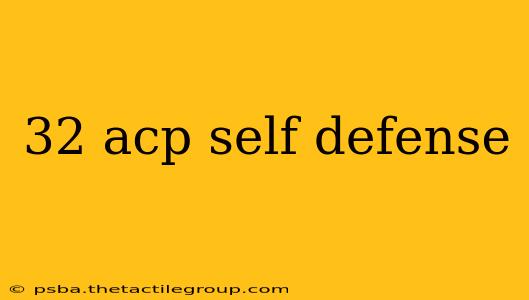The .32 ACP (Automatic Colt Pistol) cartridge has a long and storied history, but its suitability for self-defense remains a topic of frequent debate. This article delves into the realities of using a .32 ACP for self-defense, exploring its advantages and disadvantages to help you make an informed decision.
Understanding the .32 ACP's Limitations
Let's address the elephant in the room: the .32 ACP is a relatively low-powered cartridge. Compared to more popular self-defense calibers like 9mm or .45 ACP, its stopping power is significantly less. This means that a hit placement may not guarantee immediate incapacitation of an attacker. The smaller bullet diameter and lower velocity translate to less tissue damage and a higher chance of the bullet passing through the target without causing sufficient trauma to stop the threat. This isn't to say it's completely ineffective, but it requires exceptionally precise shot placement to be truly reliable.
Factors Affecting Effectiveness
Several factors influence the effectiveness of any cartridge, and the .32 ACP is no exception. These include:
- Bullet type: Hollow-point ammunition designed for expansion is crucial to maximize the .32 ACP's limited stopping power. Full metal jacket (FMJ) rounds are far less effective for self-defense.
- Shot placement: Accurate shots to vital areas (such as the central nervous system or heart) are paramount. Multiple well-placed shots might be necessary to neutralize a threat.
- Individual factors: The physical characteristics of both the attacker and the defender, such as build and the attacker's potential intoxication, also play a significant role.
Advantages of the .32 ACP for Self-Defense
Despite its limitations, the .32 ACP offers some advantages:
- Recoil: Its low recoil makes it easier to control, especially for smaller-statured individuals or those new to firearms. This translates to faster follow-up shots if needed.
- Concealability: The smaller size of the cartridge allows for the use of slimmer, more easily concealable handguns. This can be a critical factor for those who prioritize discreet carry.
- Ammunition availability: While not as common as 9mm or .45 ACP, .32 ACP ammunition is still readily available from most major firearm retailers.
Alternatives to Consider
Given the .32 ACP's limitations, many self-defense experts recommend considering higher-caliber options such as the 9mm, .380 ACP, or .45 ACP. These rounds offer significantly greater stopping power and penetration, increasing the likelihood of neutralizing a threat quickly and effectively.
Conclusion: A Careful Consideration
The decision of whether or not to use a .32 ACP for self-defense is a personal one. While it presents advantages in terms of recoil and concealability, its significantly lower stopping power compared to other calibers should be carefully weighed. Accurate shot placement is paramount, and even then, the outcome might not always be guaranteed. Thorough firearm training, including realistic scenario practice, is absolutely essential for anyone choosing to rely on a .32 ACP for self-defense. Ultimately, prioritizing safety and responsible firearm ownership is key. Consult with a firearms expert and consider your personal needs and capabilities before making a decision about your self-defense firearm and ammunition.

